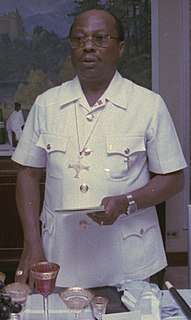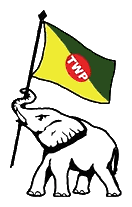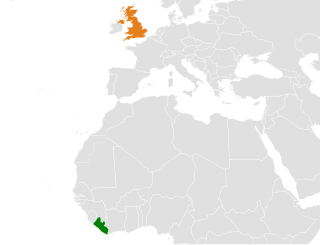Related Research Articles

Liberia, officially the Republic of Liberia, is a country on the West African coast. It is bordered by Sierra Leone to its northwest, Guinea to its north, Ivory Coast to its east, and the Atlantic Ocean to its south and southwest. It has a population of around 5 million and covers an area of 43,000 square miles (111,369 km2). English is the official language, but over 20 indigenous languages are spoken, reflecting the country's ethnic and cultural diversity. The country's capital and largest city is Monrovia.

The Armed Forces of Liberia (AFL) are the armed forces of the Republic of Liberia. Tracing its origins to a militia that was formed by the first black colonists in what is now Liberia, it was founded as the Liberian Frontier Force in 1908, and retitled in 1956. For almost all of its history, the AFL has received considerable materiel and training assistance from the United States. For most of the 1941–89 period, training was largely provided by U.S. advisers, though this assistance has not prevented the same generally low levels of effectiveness common to most of the armed forces in the developing world.

William Richard Tolbert Jr. was a Liberian politician who served as the 20th president of Liberia from 1971 until 1980.

Monrovia is the capital city of the West African country of Liberia. Founded in 1822, it is located on Cape Mesurado on the Atlantic coast, and is the country's most populous city. As of the 2008 census, with 1,010,970 residents, it was home to 29% of Liberia’s total population. Monrovia is also the country’s economic, financial and cultural center. Its economy is primarily centered on its harbor and its role as the seat of Liberia's government.

The True Whig Party (TWP), also known as the Liberian Whig Party (LWP), is the oldest political party in Liberia and one of the oldest parties in Africa. Founded in 1869 by primarily darker-skinned Americo-Liberians in rural areas, its historic rival was the Republican Party. Following the decline of the latter, it dominated Liberian politics from 1878 until 1980. The nation was virtually governed as a one-party state under the TWP, although opposition parties were never outlawed.

Charles Gyude Bryant was a Liberian politician and businessman. He served as the Chairman of the Transitional Government of Liberia from 14 October 2003 to 16 January 2006. The installation of the transitional government was part of the peace agreement to end the country's second civil war, which had raged since the Liberians United for Reconciliation and Democracy (LURD) rebelled against President Charles Taylor in 1999. Bryant was previously a businessman and was chosen as chairman because he was seen as politically neutral and therefore acceptable to each of the warring factions, which included LURD, the Movement for Democracy in Liberia (MODEL), and loyalists of former President Taylor. He was a prominent member of the Episcopal Church of Liberia, and was critical of the governments of Samuel Doe (1980–90) and Taylor (1997–2003).

Montserrado County is a county in the northwestern portion of the West African nation of Liberia containing its national capital, Monrovia. One of 15 counties that comprise the first-level of administrative division in the nation, it has 17 sub political districts. As of the 2008 Census, it had a population of 1,118,241, making it the most populous county in Liberia. The area of the county measures 1,912.7 square kilometres (738.5 sq mi), the smallest in the country. Bensonville serves as the capital.

CEMEX S.A.B. de C.V., known as Cemex, is a Mexican multinational building materials company headquartered in San Pedro, near Monterrey, Mexico. It manufactures and distributes cement, ready-mix concrete and aggregates in more than 50 countries. In 2020 it was ranked as the 5th largest cement company in the world, at 87.09 million tonnes.
Winston A. Tubman is a Liberian diplomat and politician of Americo-Liberian descent. He is a former justice minister and diplomat for the nation, as well as having been the standard bearer of the Congress for Democratic Change (CDC).
William Vacanarat Shadrach Tubman Jr. is a Liberian politician and member of the Reformed United Liberia Party (RULP). He is the son of William Tubman, who was President of Liberia from 1943 to 1971, and the son-in-law of his father's successor, William R. Tolbert Jr., whose daughter Wokie he married.
A new civil war began in 1999 when a rebel group backed by the government of neighboring Guinea, the Liberians United for Reconciliation and Democracy (LURD), emerged in northern Liberia. By the spring of 2001, they were posing a major threat to the Taylor government. Liberia was now engaged in a complex three-way conflict with Sierra Leone and the Guinea Republic. By the beginning of 2002, both of these countries were supporting the latest addition to the lexicon of Liberian guerrilla outfits – Liberians United for Reconciliation and Democracy (LURD), while Taylor was supporting various opposition factions in both countries. By supporting Sierra Leonean rebels, Taylor also drew the enmity of the British and Americans.
Albert Porte was an Americo-Liberian political journalist and dissident who was the editor of the Crozerville Observer. In 1946, he became the first Liberian journalist to be imprisoned by President William Tubman. The first major movement toward civil society in Liberia is traced back to Porte's activities.
In March 2010, the Freeport of Monrovia became ISPS Compliant and moved from Security Level 2 to Security Level 1 in July 2010. The Freeport of Monrovia awarded Operations Contract to APM Terminal to handle port operations, which includes container handling, cargo handling, and marine.

General elections were held in Liberia on 11 October 2011, with a second round of the presidential election on 8 November. The presidency, as well as all seats in the House of Representatives and half of the seats in the Senate, were up for election. The election was overseen by the National Elections Commission (NEC).

Benoni Wilfred Urey is an Americo-Liberian businessman and politician, who was formerly the Liberian Commissioner of Maritime Affairs. In 2014 The Economist reported that Urey was Liberia's wealthiest man.

Liberia did not become militarily involved in World War II until January 1944, with the election of William Tubman, at which time the country declared war on Germany and Japan. However, even before the start of Liberia's official military involvement, the nation participated in the war for two years under the terms of a Defense Agreement with the United States. Apart from Ceylon and the Belgian Congo, Liberia possessed one of the few remaining sources of rubber for the Allies. To guarantee a steady supply of rubber from the world's largest rubber plantation, operated at Harbel by the Firestone Company since 1926, the US government built roads throughout the country, created an international airport, and transformed the capital, Monrovia, by building a deep water port.

Gbehzohngar Milton Findley is a Liberian politician and businessman. He is a former President Pro Tempore of the Liberian Senate and also the Minister of Foreign Affairs in the administration of President Weah until 28th July 2020.

The Executive Mansion of Liberia is the official residence and workplace of the country's president. Located across the street from the Capitol Building in the Capitol Hill district of Monrovia, the current building was constructed during the presidency of William Tubman, which lasted from 1944 to 1971. The construction started in 1961, and was completed in 1964.

Squatting in Liberia is one of three ways to access land, the other being ownership by deed or customary ownership. West Point was founded in Monrovia in the 1950s and is estimated to house between 29,500 and 75,000 people. During the First Liberian Civil War 1989–1997 and the Second Liberian Civil War 1999–2003, many people in Liberia were displaced and some ended up squatting in Monrovia. The Ducor Hotel fell into disrepair and was squatted, before being evicted in 2007. Recently, over 9,000 Burkinabés were squatting on remote land and the Liberia Land Authority (LLA) has announced it will be titling all land in the country.

Liberia–United Kingdom relations refer to the bilateral relations between Liberia and the United Kingdom. The United Kingdom was the first country to recognize Liberian independence. Liberia has a history of border disputes with the British Colony of Sierra Leone, as well as cumbersome British loans which have at times compromised Liberian sovereignty.
References
- ↑ NPA Evicts Cemenco From Three Warehouses, AllAfrica.com, 2012-04-24. Accessed 2012-11-07.
- 1 2 3 To Increase Production: CEMENCO Installs New Mill, Liberian Observer , 2012-11-05. Accessed 2012-11-07.
- ↑ "President Tubman to Open Cement Factory". [Monrovia] Daily Listener 1968-01-04: 1.
- 1 2 CEMENCO 'Air Pollution' Outrages Residents, Liberian Observer 2012-09-26. Accessed 2012-11-07.
- ↑ NPA Wants CEMENCO Vacate Warehouses, But...", The Inquirer , 2012-11-07. Accessed 2012-11-07.
- ↑ After 25 Years on Wall Street, Richard Tolbert Heading Home [Usurped!], TLC Africa, 2005. Accessed 2012-11-07.